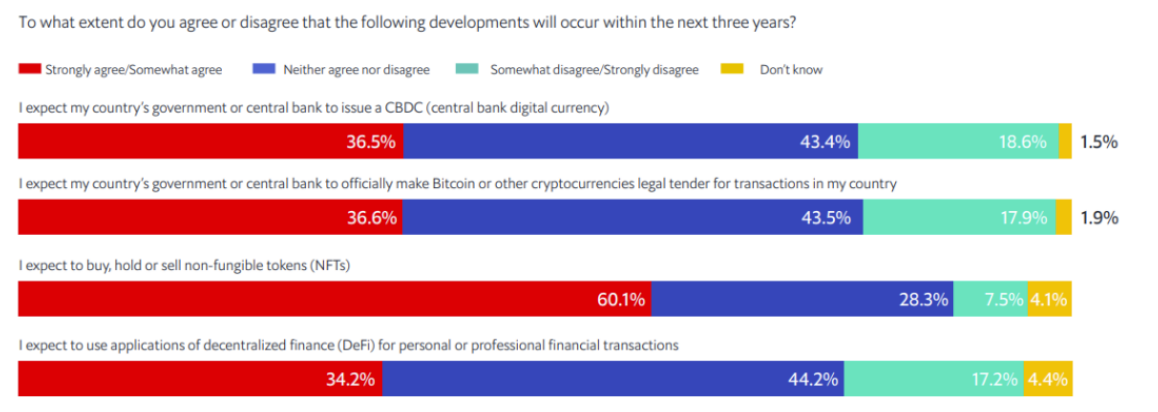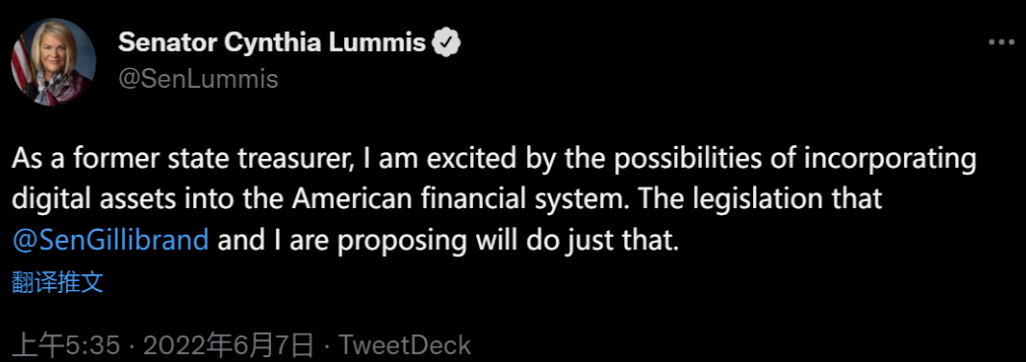Original link: https://www.hellobtc.com/kp/du/06/3966.html
Author: Terry / Source: Vernacular Blockchain

Author | Terry
Produced | Vernacular Blockchain (ID: helloBTC)
According to a recent study conducted by The Economist, 36.6% of respondents want Bitcoin or other crypto assets to be legalized, 43.5% are neutral, and only 17.9% Respondents expressed disapproval of the move.

At the same time, in addition to individuals, at the current national or regional level, policies and attitudes towards cryptocurrencies or Web3 have begun to improve, and this will be a long-term positive for the development of encrypted assets and the Web3 wave. trend.
01
positive policy
-
El Salvador, “All in”
El Salvador, under the active leadership of its President Nayib Bukele, can be described as a model of “All in BTC”. So far, Nayib Bukele’s social media homepage avatars are all cypherpunk-like laser eye pictures.

On September 7, 2021, El Salvador officially designated Bitcoin as legal tender, including the launch of the electronic wallet Chivo and the deposit of $30 in Bitcoin for each of the residents who downloaded the wallet.
Including follow-on El Salvador’s $1 billion bitcoin bond issuance plan (currently on hold) – half of the funds raised will be used to buy bitcoin and hold it for five years, and the rest will be used to fund bitcoin-related construction projects .
“The funds raised from the bond issue will be used to build a city called Bitcoin City, and this bond issue will make El Salvador the new world financial center.”
-
Positive turn for Central Africa
The Central African Republic should be the second country after El Salvador in recent years to fully embrace cryptoassets at the official level.
On April 27, the official Facebook account of the Central African Republic announced that the Central African Republic officially adopted Bitcoin as a payment currency.

The Central African Republic then announced Project Sango, a plan to create a crypto center, including a “crypto island” and a digital wallet.
Earlier this month, news broke that it plans to tokenize access to its natural resources, providing tokenized access to mineral resources for crypto and digital asset projects establishing operations in the country.
-
Japan in “Web3 National Strategy”
Japan is not only a major country in developed economies with a more lenient attitude towards encrypted assets, but its recent positive evaluation and layout of Web3 is even rarer. The new Prime Minister Fumio Kishida has almost elevated the development of Web3 to the national strategic level, intending to cite one country as one. force to promote the development of Web3.
These include, but are not limited to, the approval of a series of reform guidelines for Web3, and the creation of a Web3 minister to promote NFTs and DAOs.
Last month, Fumio Kishida expressed his belief that Web3 will boost Japan’s economic growth when he was questioned in parliament last month. He believed that Japan’s economic growth would be achieved by introducing new digital services, such as the Metaverse and NFT. At the same time, he may be willing to reform Japan. crypto tax law.
And this month Japan’s parliament passed a stablecoin bill that clarifies the legal status of stablecoins, defining them as essentially digital currencies.
Under the new bill, stablecoins must be pegged to Japanese yen or other fiat currencies and guarantee holders the right to redeem them at face value, while the new legal framework will take effect within a year, with the FSA saying it will be rolled out in the next few months Regulations governing stablecoin issuers.
02
policy neutral
In addition to countries actively embracing crypto assets and Web3, there are also quite a number of countries and regions that are actively formulating relevant policies or regulatory frameworks.
Whether the policy orientation is loose or strict, this will be a positive catalyst for the gradual mainstreaming of crypto assets and Web3.
-
U.S.
Regarding one of the most influential regulatory aspects in the United States, although the attitude is hardly completely friendly, so far no new regulations have been introduced for encrypted assets – still according to whether they are classified as securities, which belong to the United States Securities and Exchange Commission (SEC) and the U.S. Commodity Futures Trading Commission (CFTC).
It is worth noting, however, that U.S. Senators Kirsten Gillibrand and Cynthia Lummis submitted bills this month related to the U.S. cryptocurrency regulatory framework, including:
Classify digital assets as commodities, empowering the Commodity Futures Trading Commission (CFTC) to regulate the crypto industry;
Responsibilities for different parts of the crypto market will be allocated to different institutions, creating a minimum tax exemption for small crypto transactions;
DAOs, CEXs, and stablecoin providers must become registered entities, and if they don’t, they’ll be charged and taxed, etc.

In addition, the U.S. tax department is also tightening its regulation of crypto taxation. Last week, it was reported that the U.S. tax agency may implement a crypto tax whistleblower program to reward individuals who provide information about crypto income.
At the same time, regulators such as the Federal Reserve have increased their attention and policy influence on stablecoins, and relevant actions on issues such as stablecoin supervision and digital dollars are also on the horizon.
-
Dubai
Since the beginning of this year, Dubai has gradually become a hot spot for the development of encrypted assets and industry institutions, which is mainly due to the laws passed by Dubai to regulate virtual assets, and correspondingly established an independent supervision agency for virtual assets :
In March this year, Dubai passed its first law to regulate virtual assets and established an independent body, the Dubai Virtual Assets Regulatory Authority (VARA), in terms of regulation, licensing, governance and alignment with local and global financial systems. Oversee the development of virtual assets in Dubai.
In recent months, industry institutions such as Binance and FTX have successively obtained licenses or set up offices in Dubai, and have begun to become one of the major urban centers for the development of the crypto world.
-
Singapore
Compared with Dubai, Singapore has been strengthening its regulatory scrutiny of crypto assets, after the Monetary Authority of Singapore issued regulatory guidelines on the promotion of crypto assets to the public/media.
Singapore now requires Singapore-registered digital asset service providers to obtain authorization and comply with local AML/KYC regulatory requirements after going overseas. The Monetary Authority of Singapore will also supervise digital asset service providers with overseas business.
On May 31st, the Monetary Authority of Singapore announced the launch of Project Guardian, a collaborative program with the financial industry to explore the economic potential and value-added use cases of asset tokenization. The program will also test Feasibility of asset tokenization and DeFi applications while managing risks to financial stability and integrity.
-
Russia
Russia is a special case, having previously announced that oil and gas trade is considering accepting bitcoin for settlement, but recently Ivan Chebeskov, head of the Russian Ministry of Finance’s Fiscal Policy Department, said that the ministry recommends using cryptocurrencies as an asset rather than a means of payment .
This means that cryptocurrencies can be used for barter transactions, that is, buyers officially exchange bitcoin or other cryptocurrencies for products or services, and just on June 24, Russia also filed a ban on individuals and individuals who illegally issue or trade digital assets. Act to impose financial penalties on entities.
Therefore, in general, Russia is currently using encrypted assets such as Bitcoin as an alternative payment asset in energy trade such as oil.
03
other
In addition, some countries that are more neutral when it comes to crypto asset adoption or crypto mining have some ups and downs.
-
Panama
In April, a committee of Panama’s Legislative Assembly approved a bill to regulate cryptocurrencies, but this month Panamanian President Laurentino Cortizo partially vetoed the country’s Bill 697, which regulates crypto assets, and sent it back to the country’s National Assembly.
Core elements of the bill include making the issuance of digital currencies and the tokenization of other goods regulated, and allowing citizens to use cryptocurrencies as a means of payment for goods and services, as well as taxes.
-
Iran
Iran has always been open to crypto mining and license management, but on June 22 not long ago, Iran cut off the power supply to all licensed crypto mining farms for unknown reasons.
04
summary
On the whole, for some underdeveloped areas with weak financial infrastructure, encrypted assets may provide a new supplementary option; and for some developed countries whose economies need effective growth points, Web3 may be pregnant with a new round of Tech wave.
However, whether the active embrace or adoption of policy-friendly countries, including the successive formulation of regulatory policies in various countries, can become a key variable to further promote the in-depth development of Web3, especially the exploration of more possibilities beyond traditional attributes, it is unknown.
But what is certain is that the Web3 and encryption industry will further expand in the future, and will be recognized and participated in a wider range, so supervision and regulation are also key variables that cannot be avoided.
This article is reprinted from: https://www.hellobtc.com/kp/du/06/3966.html
This site is for inclusion only, and the copyright belongs to the original author.